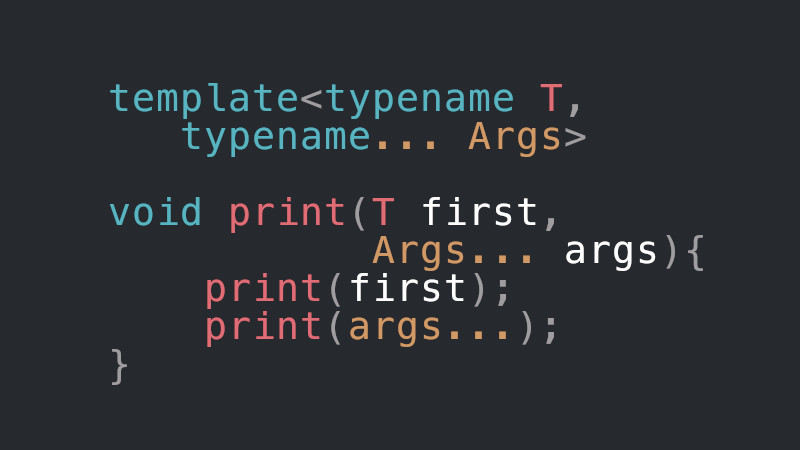
Variadic functions (or functions with a variable number of arguments) in C++ are functions that can take an indeterminate number of arguments.
This is useful when the number of arguments the function needs to process is not known in advance.
In C++, variadic functions are implemented using the ellipsis syntax (...) and macros from the <cstdarg> library.
Declaring a Variadic Function
To declare a variadic function, you specify at least one fixed parameter and then use ... to indicate that the function can accept additional arguments. Here is a simple example:
#include <iostream>
#include <cstdarg>
void printNumbers(int count, ...) {
va_list args;
va_start(args, count);
for (int i = 0; i < count; ++i) {
int num = va_arg(args, int);
std::cout << num << " ";
}
va_end(args);
std::cout << std::endl;
}
int main() {
printNumbers(3, 10, 20, 30);
printNumbers(5, 1, 2, 3, 4, 5);
return 0;
}- Inclusion of Libraries:
#include <iostream>: Includes the standard input and output library.#include <cstdarg>: Includes the necessary library to work with variadic arguments.
printNumbersfunction:void printNumbers(int count, ...): Declares a function that accepts a variable number of arguments. The first argumentcountis fixed and indicates how many additional arguments will be passed to the function.va_list args;: Declares a variableargsof typeva_list, which will be used to access variadic arguments.va_start(args, count);: Initializesargsto access arguments aftercount.int num = va_arg(args, int);: Gets the next argument from theargslist, specifying its type (intin this case).va_end(args);: Clearsargsafter all arguments have been processed.
- Use of Function:
printNumbers(3, 10, 20, 30);: Calls the function with3as the number of additional arguments, followed by the values 10,20and30.printNumbers(5, 1, 2, 3, 4, 5);: Calls the function with5as the number of additional arguments, followed by the values 1,2,3,4and5.
Important Considerations
- Type Safety: Variadic functions do not check type safety at compile time. This means that you must ensure that the types of arguments passed match those expected by the function.
- Number of Arguments: In many cases, it is necessary to provide an additional argument (such as
countin the example) to indicate how many variadic arguments are being passed. - Performance: Variadic functions may have slightly lower performance due to the need to process arguments at runtime.
Modern Alternatives
With the introduction of C++11, a safer and more flexible alternative to traditional variadic functions is the use of variadic templates and std::initializer_list. Here is an example using variadic templates:
#include <iostream>
template<typename T>
void print(T value) {
std::cout << value << " ";
}
template<typename T, typename... Args>
void print(T first, Args... args) {
print(first);
print(args...);
}
int main() {
print(10, 20, 30);
print(1, 2, 3, 4, 5);
return 0;
}Variadic functions in C++ are a powerful tool for creating functions that can handle a variable number of arguments. However, it is important to use them with caution due to the lack of type checking and other potential security issues. With C++11 and later, variadic templates offer a safer and more flexible alternative.




